Col. Sudhir Farm
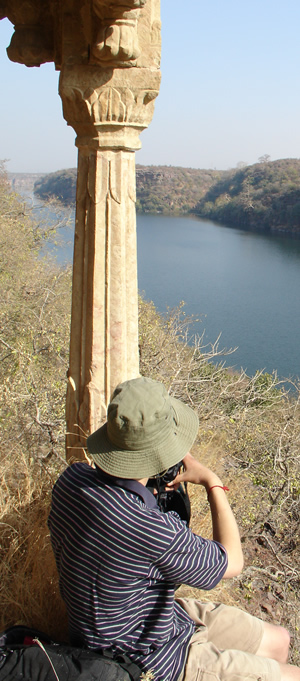
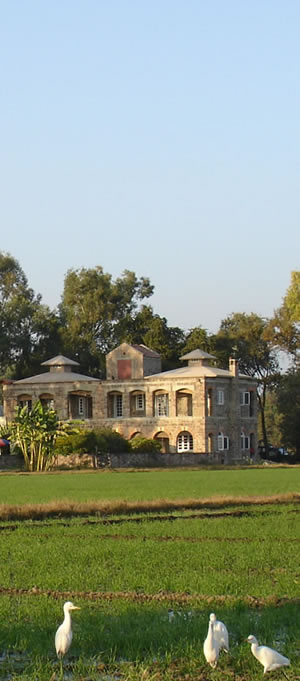
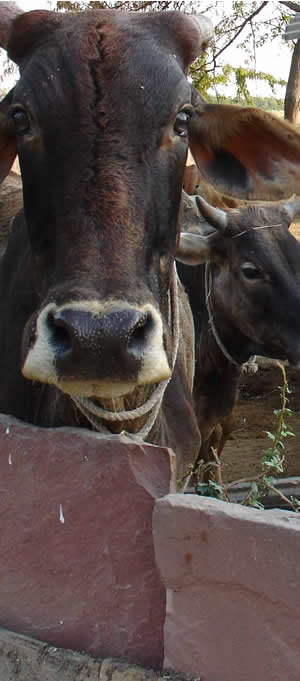
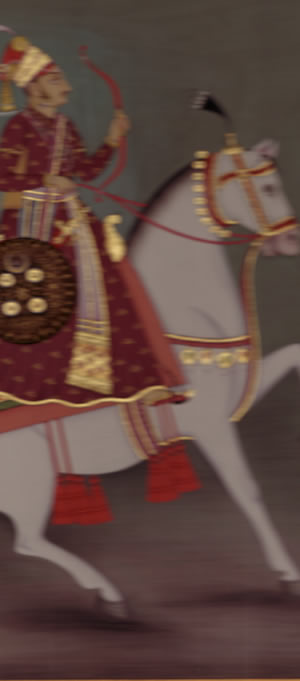
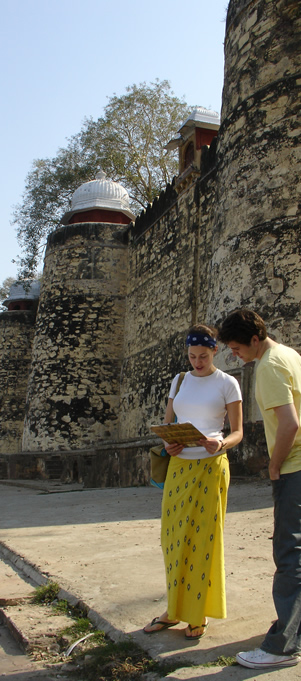
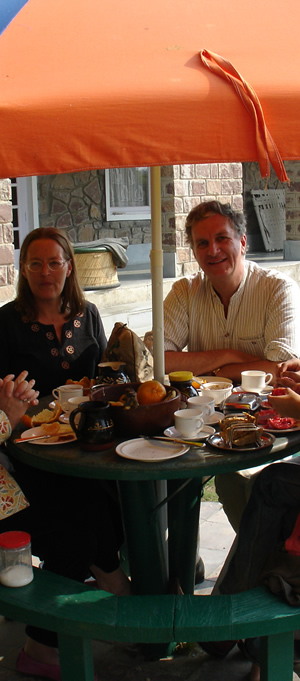
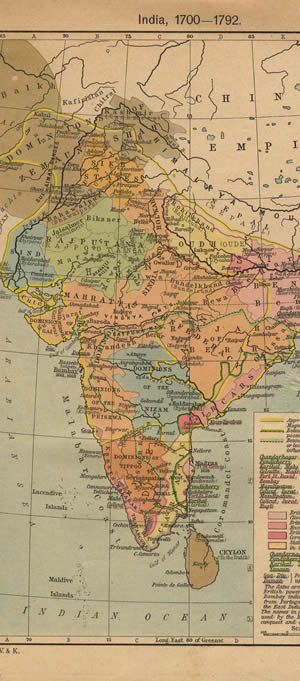
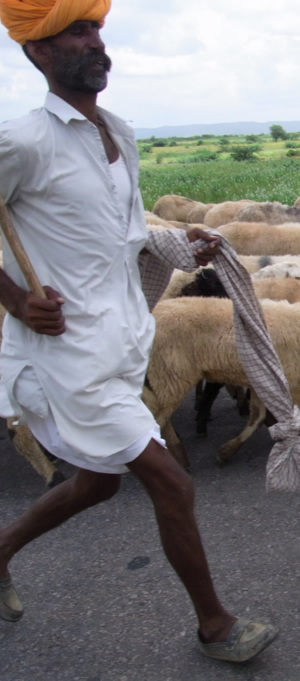
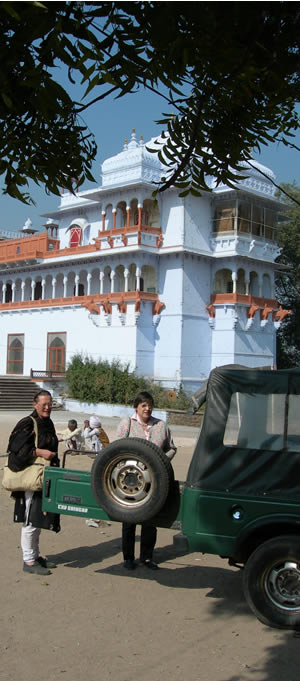
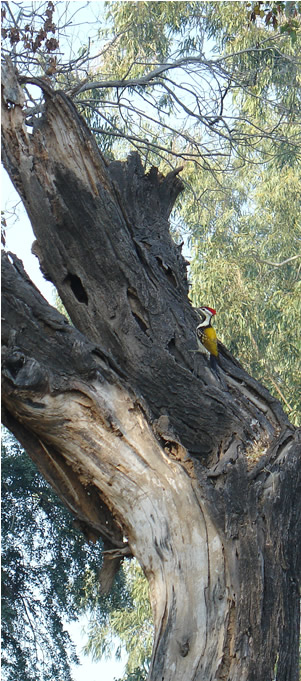
Snippets from the Visitors' Book
The Kota tonga trail was a real highlight - a bit like a 19th Century treasure hunt. It’s full of little nuggets of unusual information and fascinating glimpses into the unsolved mysteries of Kota.
Harriet and Will, London. UK
The memorial to Major Burton and his sons was much more moving than the Taj Mahal or the lake at Udaipur, marvellous as they are.
Henry Vane, Cumbria, UK
...the most comfortable bed I’ve slept in for 2 months....
Charlotte Adam, Winchester UK
Two days out of the noise and the people in a beautiful place. We felt totally
at home
- To be recommended to every person who wishes to experience the Indian country life. We also liked the way the food was prepared...
Patrick & Marie-Christine Lemaigre, Nil-St Vincent, Belgium
We’re only here for the porridge and home made bread! Thank you for a most wonderful time the memories of which we shall carry always. You have given us a wonderful & fascinating introduction to India.
Sue Turner, Lancashire, UK
So ...Rajasthan is not all desert! Thank you for sharing everything with us....
The Read family, London, UK
What a wonderful time we’ve had at the school in the village, at the weavers’, on the river, atop a tonga! Thank you for all your help and contacts throughout India
Anne Gerbner, Philadelphia, USA
It was a wonderful stay and thank you for giving us such a positive look at India and Rajasthan.
Salma Goldstein, New Jersey, USA
- There once was a lady of Kota
- Who took visitors out in her motor
- With the roads and the ruts
- It took quite some guts
- To go out with the lady of Kota.
- But once back at home on the farm
- The world quite descended to calm
- With the plants and the birds
- And fox terriers in herds
- There was balm in the calm on the farm.
Sue Millar, London, UK
After travelling around Rajasthan for two weeks, reaching a real house with books on the shelves, photos on the walls and four happy dogs was simply wonderful.
Camille Savinien, Paris, France
This isn’t tourism. I know of nowhere else where you can experience the real India as well as on your traditional working Rajasthani farm.
Sam Milward, Wellington, New Zealand
Thank you so very much for such a wonderful stay - what a fantastic introduction to India. I don’t think we’ll find such tranquillity elsewhere.
Lizzie Fortune, Hampshire. UK
Fabulous - I’ve been spoilt. It’s hard to leave and face the real world.
Elisabeth Simson, Isle of Wight, UK
After travelling around Rajasthan for two weeks, reaching a real house with books on the shelves, photos on the walls and four happy dogs was simply wonderful.
Camille Savinien, Paris, France
This isn’t tourism. I know of nowhere else where you can experience the real India as well as on your traditional working Rajasthani farm.
Sam Milward, Wellington, New Zealand
Thank you so very much for such a wonderful stay - what a fantastic introduction to India. I don’t think we’ll find such tranquillity elsewhere.
Lizzie Fortune, Hampshire. UK
Our visit at the farm was truly wonderful, off the beaten track it is a slice of India a visitor does not normally experience. Victoria is very knowledgeable about Indian culture and the people - an added perspective for us. The food here was very delicious: organically home grown ingredients, vegetables, fruits, grains prepared simply homestyle. A nice change from curries. Enjoyed the early morning boat ride and walk to the weavers. Many thanks.
Johanna Janssens, Washington, USA
I loved staying with you and the dogs and playing with the toys.
Jonas aged 8, Switzerland
A very welcome break from the crazy world of India – wonderful house, food and hospitality. Thank you so much.
Katie Buxton, Bath, UK
I loved seeing the crocodiles, and I learned a lot about deticking the puppies. Coming to the farm was a great experience.
Stella Bartholet, Washington, USA
A wonderful eye opening visit in every sense. We will be back! Thank you!
Christopher & Joanna Hobson, Northamptonshire, UK
A blissfully peaceful stay. We enjoyed everything – even the power cut. Thank you for lovely food, good company and very interesting trips.
Vicky Stark, London, UK
Exactly what we hoped for and more, bits of India off the tourist track, life as it actually is in villages, teeming life and livestock and the magic of the river.
Sir Hilary Miller, Worcester, UK
Thank you for the introduction to miniature painters, wall paintings, stories, great food, good company, walk through the fields. I loved the paintings in the City Palace and go back full of inspiration and memories.
Nan Mulder, Edinburgh, UK

On the Farm - 2020 Archive
On the Farm - December ’20
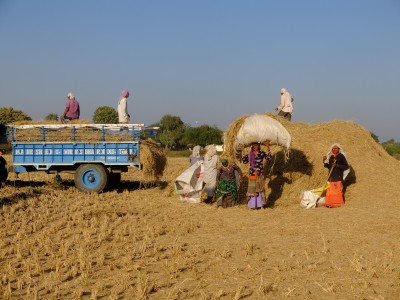 In December, on the whole, we had glorious weather. Just look at the blue sky in this photograph of moving the rice straw (known as pral) from the fields to prepare for wheat sowing.
In December, on the whole, we had glorious weather. Just look at the blue sky in this photograph of moving the rice straw (known as pral) from the fields to prepare for wheat sowing.
On 11th December there was drizzle all day and unfortunately that was a very auspicious day for weddings. Sugna, our maid, was involved with a nephew’s wedding. They were allowed 100 guests under covid regulations but finally fed 500 (in shifts?) with the knowledge of the police and no covid outbreak resulted as far as we know. There has been no covid in rural areas and mask wearing has only been enforced in the towns. However, schools and colleges and coaching institutes are still closed.

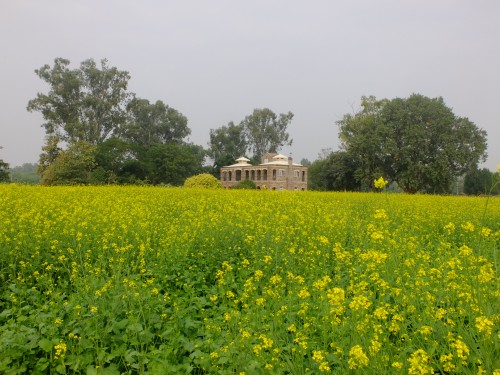 The mustard was in full bloom and glowed in the sunlight. The night skies were so clear that we saw the Grand Conjunction on 21st December and could see Saturn’s rings and Jupiter’s moons through a bird spotting scope.
The mustard was in full bloom and glowed in the sunlight. The night skies were so clear that we saw the Grand Conjunction on 21st December and could see Saturn’s rings and Jupiter’s moons through a bird spotting scope.

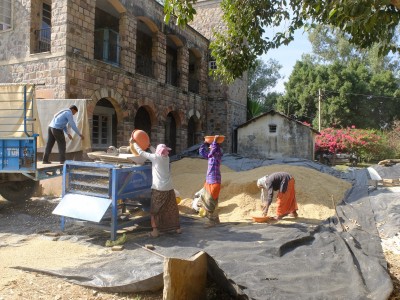 Before selling the rice we winnowed it through this machine and then filled the trollies directly. Our best price was Rs. 26.76 per kilogram. The highest ever was in 2018-2019, when we earned Rs. 28.51. The lowest was last year when the quality and yield were poor because of a long heavy monsoon and resulting fungus. This year the yield was good although our irrigation bill was higher as it hardly rained in September.
Before selling the rice we winnowed it through this machine and then filled the trollies directly. Our best price was Rs. 26.76 per kilogram. The highest ever was in 2018-2019, when we earned Rs. 28.51. The lowest was last year when the quality and yield were poor because of a long heavy monsoon and resulting fungus. This year the yield was good although our irrigation bill was higher as it hardly rained in September.
Farmers have been agitating in Delhi against the three agriculture laws brought in by the central government, but local Rajasthan farmers are largely indifferent. We rarely get the crops sold for the government’s minimum support price (MSP) and are aware that the big farmers in Punjab, Haryana and western Uttar Pradesh have done very well from being well connected to the source of the funds. We personally don’t like contract farming but the farmer earns more money - so far so good. We fear these new laws may lead to commodity production with all its negative ramifications for small farmers and land holders. They will then be at the mercy of the big corporations. Not nice and we sympathise. Further down the road, plugging into a globalised commodity market controlled from abroad could be disastrous for a country like India.

We sawed wood for our log fire and decorated the house for Christmas knowing we would have few if any visitors.
Once the rice fields were clear we ploughed, watered and sowed wheat. This takes a long time and sowing gets delayed. In one field we experimented with using a rotary tiller to break up the soil, sowing and then watering, which saves time. The germination was good and so far it has been a success. The last wheat was sown on 26th December which is a little later than we like.

A tragedy this month was that our young cow man’s younger brother aged about 16, hanged himself with one of his mother’s saris when everyone in the family was out. Since his school was closed, he’d got a job at a local garage. He died without anyone in the family knowing he felt suicidal. By 9.00pm he had been cremated and no official body was told of his death as they didn’t want to endure the ensuing enquiries by the authorities. Will he appear in any figures for suicides in the state or country over time is anybody’s guess.

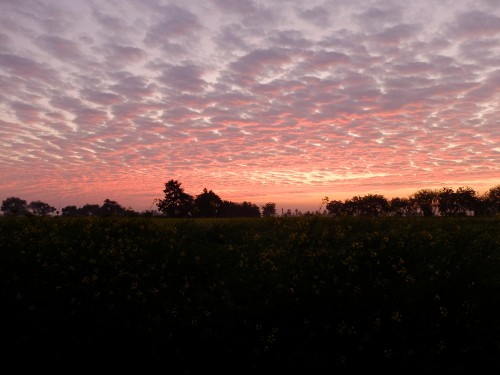 And to end on a less sombre note, we did have some stunning sunrises in December. These colours have not been enhanced.
And to end on a less sombre note, we did have some stunning sunrises in December. These colours have not been enhanced.
On the Farm - November ’20
November started with the announcement of the result of our local municipal elections for a ward member. Our ward was reserved for a woman from a scheduled caste or tribe this time around and we had the choice of three women with the surname Meena. One was the wife of the sitting BJP ward member and she didn’t get many votes. Another was the college going daughter-in-law of a congress elder. The third, Ina Meena, was also a college student and campaigned as an independent under the symbol of a cricket bat and ball.
Ina Meena distributed cricket bats and balls to the children in the ward and won by 126 votes. She is chaperoned by her brother and his mobile number is used to contact her. We have high hopes that Ina Meena will help Mewalal’s daughter who has Down Syndrome.
Mewalal continued to walk over to the farm at 8.30am to touch our feet. He is gradually regaining strength and the use of his fingers. At Diwali he was able to help with the Govardhan puja. He was also able to say his farewell to Lasho, our patriarchal bull, on the day that he died.
Lasho had needed help getting up on 7th November and had been given brown sugar or gur and bran to energise him. Two days later he had been helped up, had walked around a bit and had chosen a final resting place under a tree. He had died the following morning. The Nagar Nigam (municipality) cow removal team had come a few hours later and Lasho left the farm for the first time and the last. He lived a good life on the farm for 17 years.

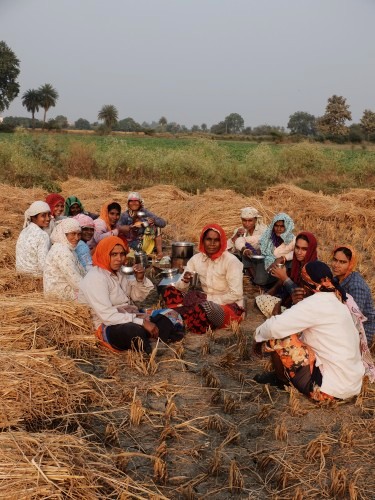 The main agricultural focus of the farm was on rice cutting. Two teams of women worked on different fields. One team of fourteen and the other of ten. Here is the group of fourteen brewing up on an open fire surrounded by tinder dry rice! No health and safety worries here....
The main agricultural focus of the farm was on rice cutting. Two teams of women worked on different fields. One team of fourteen and the other of ten. Here is the group of fourteen brewing up on an open fire surrounded by tinder dry rice! No health and safety worries here....

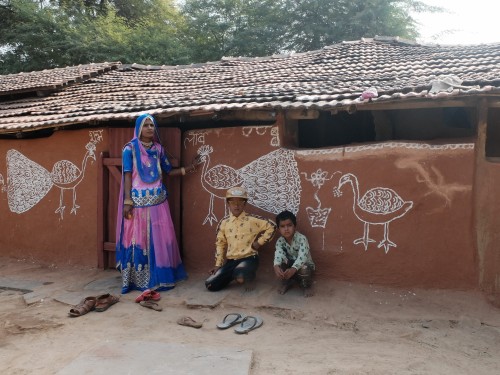 Diwali was on 14th November this year although gatherings were banned. Asha prepared her house for it by painting peacocks on the walls known as mandana. Her two sons are part of my daily literacy class but she took them to the safety of her brother’s house soon after Diwali after an incidence of alcohol induced domestic violence and I haven’t seen them since.
Diwali was on 14th November this year although gatherings were banned. Asha prepared her house for it by painting peacocks on the walls known as mandana. Her two sons are part of my daily literacy class but she took them to the safety of her brother’s house soon after Diwali after an incidence of alcohol induced domestic violence and I haven’t seen them since.

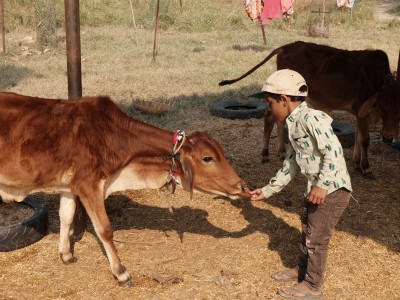
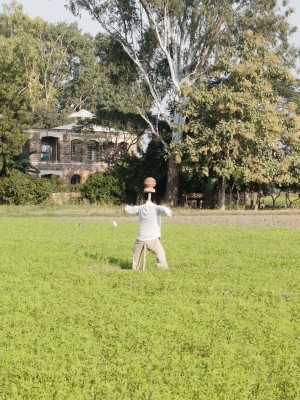
As part of Govardhan puja the cows and calves are given sweetened puris. Here is Pintoo giving one to a calf. As the bersim has grown the nightly visits by nilgai and wild pigs have become a problem. Deepak made a scarecrow with a clay matka (pitcher) for a head. He punched two roundish holes in it for eyes and said that a light inside would glow through the sockets and frighten the animals, but we could’t get the light to stay alight, and anyway the animals ignored the strange creature standing amongst their favourite midnight snack.

On 21st November the State government imposed Section 144 banning meetings of more than six persons except for marriages (100 allowed) and political rallies for which there are no limits and all participants are assumed to be immune to the covid virus. A nightly curfew closes the shops by 8.00pm. This order is in place for two months. The schools, colleges and coaching institues have yet to go back.

We had light drizzle on 26th November which stopped the threshing of the rice and the women were sent home. It was dry enough to continue the next day. It was very gloomy with the temperature only getting up to 22oC.
A total of five trolley loads of rice were threshed and stored under big black plastic sheets waiting for the rice price to go up. The yield is much better than last year. From the same land it took eleven hours to thresh the rice last year. This year it took sixteen-and-a-half hours.
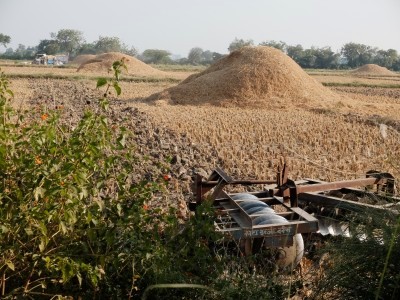 In this photo, threshing is going on in the background. The galas or piles of pral or rice straw are waiting in the field to be taken away for fodder. The straw from our basmati type rice is enjoyed by cows and so there is no question of stubble burning. The disc plough in the foreground has already been used to prepare the field for the next crop - wheat.
In this photo, threshing is going on in the background. The galas or piles of pral or rice straw are waiting in the field to be taken away for fodder. The straw from our basmati type rice is enjoyed by cows and so there is no question of stubble burning. The disc plough in the foreground has already been used to prepare the field for the next crop - wheat.

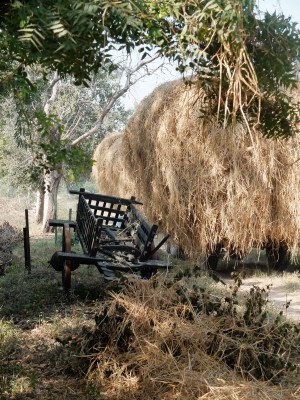 And in this favourite photograph of mine two trollies of pral are leaving the farm while the old bullock cart gently collapses from termite infestation. Symbol of a bygone era.
And in this favourite photograph of mine two trollies of pral are leaving the farm while the old bullock cart gently collapses from termite infestation. Symbol of a bygone era.
On the Farm - October ’20
October has been an eventful month with the temperature decreasing gradually to a pleasant 31oC or so with cool nights. The mustard thrived and we gave it an early watering to encourage ungerminated seeds to sprout and fill in the gaps. There was no rain all month.

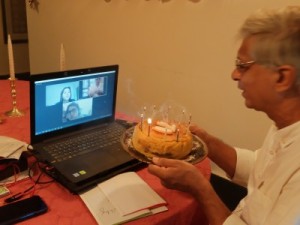 Vijay celebrated his 70th birthday by planting 30 orange citrus trees and 20 native trees. As a sign of the times we held a Zoom tea party with our children and grandchildren.
Vijay celebrated his 70th birthday by planting 30 orange citrus trees and 20 native trees. As a sign of the times we held a Zoom tea party with our children and grandchildren.

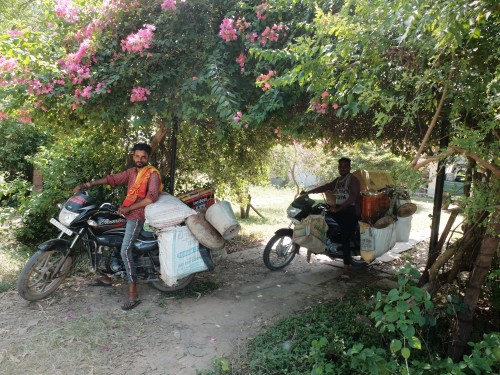 I didn’t mention lockdown restrictions in September and they were not onerous. Similarly in October, life is superficially back to normal but schools and colleges are still not back. This deprives the majority of rural children of access to formal education as they have no internet.
I didn’t mention lockdown restrictions in September and they were not onerous. Similarly in October, life is superficially back to normal but schools and colleges are still not back. This deprives the majority of rural children of access to formal education as they have no internet.
The parents of such children are often struggling to earn money to feed the family. Cheap subsidised wheat is available for such families but nothing else. We flagged down two kabari wallahs going past on motorbikes and invited them in to take our recyclable stuff. They were from a nomadic community called the banjara and had had no income for several months. They bought a year’s worth of our scrap metal, tin, bottles and newspapers for Rs. 550.

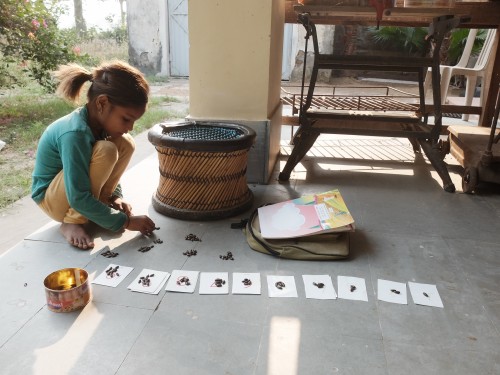 My Verandah School for four children had only one pupil for most of October as the three boys were staying with their grandparents. Here Ritu is learning to match seeds to numbers.
My Verandah School for four children had only one pupil for most of October as the three boys were staying with their grandparents. Here Ritu is learning to match seeds to numbers.

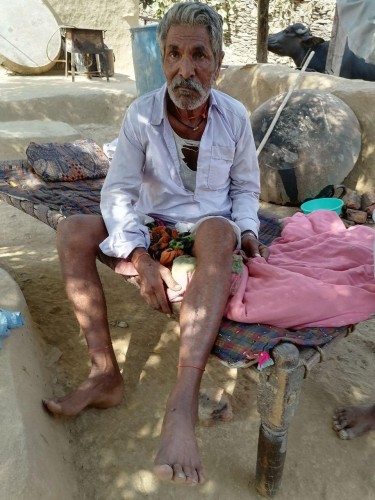 The main drama this month has not been covid related. Our cow man of many years, Mewa Lal, is a pensioner and receives Rs. 750 from the government each month so he has to keep working to support his wife and adult daughter with Down’s syndrome. This is a cause of great worry for him. On 9th October he went back to his village north of Bundi as his brother had died from cancer. He didn’t return and we heard two days later that he’d suffered a major stroke and was paralysed on his left side. Vijay went to find him and he had recovered enough to be able to sit up and speak a little. He had avoided doctors and hospitals and had been taken twice to a Mataji Temple 25 kms. away. Vijay promised him Rs. 4000 and to pay his electricity bill each month for the forseeable future.
The main drama this month has not been covid related. Our cow man of many years, Mewa Lal, is a pensioner and receives Rs. 750 from the government each month so he has to keep working to support his wife and adult daughter with Down’s syndrome. This is a cause of great worry for him. On 9th October he went back to his village north of Bundi as his brother had died from cancer. He didn’t return and we heard two days later that he’d suffered a major stroke and was paralysed on his left side. Vijay went to find him and he had recovered enough to be able to sit up and speak a little. He had avoided doctors and hospitals and had been taken twice to a Mataji Temple 25 kms. away. Vijay promised him Rs. 4000 and to pay his electricity bill each month for the forseeable future.
Through simple faith and the grace of God Mewa Lal recovered and was able to come home to his wife and daughter. On 27th he walked to the farm to touch his head to the ground before each of us and to meet the cows. He walks 4 kms. each day as he visits morning and evening. He obviously feels this is the only way to ensure we keep paying his pension.

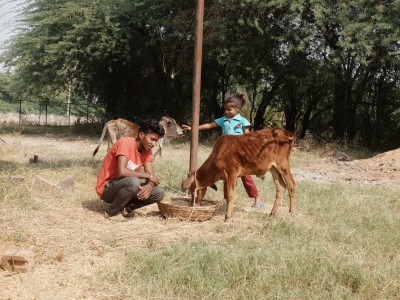 We needed to employ another cow man and after enquiries employed 20-year old relation of Amarlal’s who usually makes furniture but has taken six months leave to look after our cows until his father can leave his current employment and they all move here.
We needed to employ another cow man and after enquiries employed 20-year old relation of Amarlal’s who usually makes furniture but has taken six months leave to look after our cows until his father can leave his current employment and they all move here.
We are in need of more accommodation as Amerlal, who had said he was leaving at the end of October, changed his mind and so will not be vacating his house. We are planning to build a room over the toilet block.

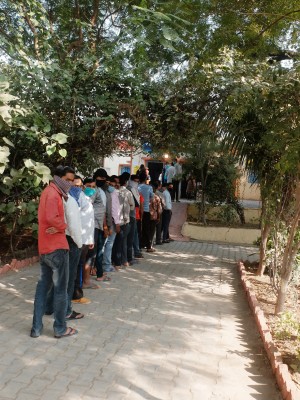 And finally for October we all voted in the municipal elections for a ward member. The seat was reserved for a scheduled caste or tribe woman and so we had a choice of three women called Meena. Manju Meena was the wife of the current BJP ward member and got very few votes. Sanju Meena was the daughter-in-law of a Congress party leader and did well but she was beaten by Ina Meena, a young Independent who adopted the cricket bat as her symbol and went round villages distributing cricket bats to the children. She won by 128 votes. When she has settled in her office I shall go and try and get some disability allowance and support for Mewa Lal’s daughter. 66% of the constituency used electronic voting machines successfully and the results were available within hours and were accepted as free and fair.
And finally for October we all voted in the municipal elections for a ward member. The seat was reserved for a scheduled caste or tribe woman and so we had a choice of three women called Meena. Manju Meena was the wife of the current BJP ward member and got very few votes. Sanju Meena was the daughter-in-law of a Congress party leader and did well but she was beaten by Ina Meena, a young Independent who adopted the cricket bat as her symbol and went round villages distributing cricket bats to the children. She won by 128 votes. When she has settled in her office I shall go and try and get some disability allowance and support for Mewa Lal’s daughter. 66% of the constituency used electronic voting machines successfully and the results were available within hours and were accepted as free and fair.
America could learn a lesson.
On the Farm - September ’20
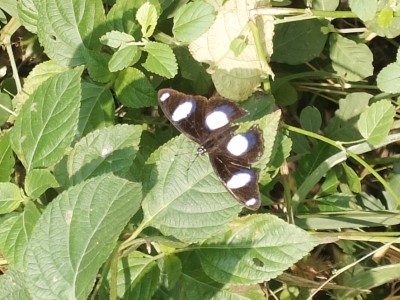 September, although the last monsoon month, has been relatively dry, hot and humid. We had approximately 15cms rain bringing the monsoon total to 87.5cms. Last year it was 148cms. There was rain on only 6 days out of 30. Here is a male eggfly butterfly basking in the sun after a wet night.
September, although the last monsoon month, has been relatively dry, hot and humid. We had approximately 15cms rain bringing the monsoon total to 87.5cms. Last year it was 148cms. There was rain on only 6 days out of 30. Here is a male eggfly butterfly basking in the sun after a wet night.

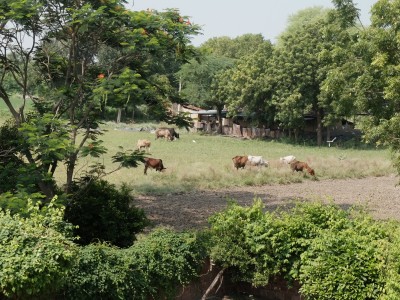 The lush monsoon grass was enjoyed by the cows and then the fields were ploughed to prepare the soil for mustard sowing.
The lush monsoon grass was enjoyed by the cows and then the fields were ploughed to prepare the soil for mustard sowing.
Here they enjoy the last field before it was ploughed.
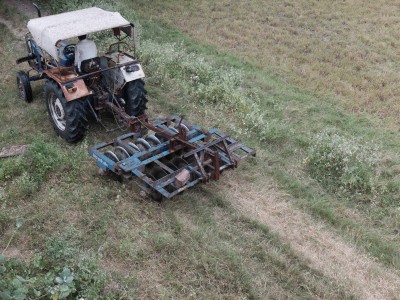 A view from above of the disc harrow used for breaking the clods.
A view from above of the disc harrow used for breaking the clods.

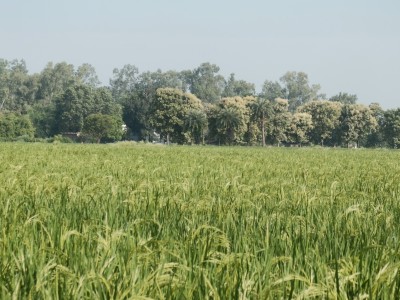 By the end of September the rice was ‘flowering’. In the background you can see flowering teak trees. Less fungus on the rice than last year but some stem borer infestation. We didn’t spray.
By the end of September the rice was ‘flowering’. In the background you can see flowering teak trees. Less fungus on the rice than last year but some stem borer infestation. We didn’t spray.

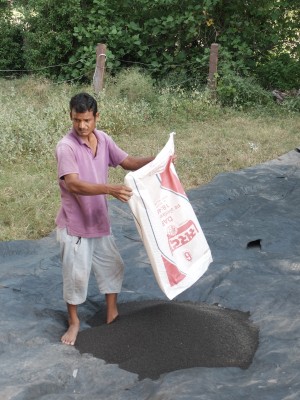 This is di-ammonium phosphate (DAP) into which sulphur and mustard seed was mixed before sowing on 30th September. You would expect it to be light in colour but they add a colouring agent. India is the world’s largest importer of DAP and most of it came from Hubei province in China which was locked down for weeks. India had to source it from elsewhere for some time but there has been no effect on supply or price that we have noticed. Indian businesses are encouraged to boycott Chinese goods because of their aggressive border policies but it is not clear if there will be a substantial change. Since imported DAP is coloured black, Indian produced DAP appears to be coloured black too to compete. This raises questions about dye run-off into the ground water.
This is di-ammonium phosphate (DAP) into which sulphur and mustard seed was mixed before sowing on 30th September. You would expect it to be light in colour but they add a colouring agent. India is the world’s largest importer of DAP and most of it came from Hubei province in China which was locked down for weeks. India had to source it from elsewhere for some time but there has been no effect on supply or price that we have noticed. Indian businesses are encouraged to boycott Chinese goods because of their aggressive border policies but it is not clear if there will be a substantial change. Since imported DAP is coloured black, Indian produced DAP appears to be coloured black too to compete. This raises questions about dye run-off into the ground water.
On the Farm - August ’20
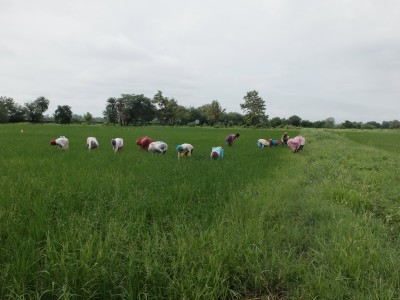 After July in which only 11.55 cms. rain fell, we had rain on 19 days in August and a total of 45.74 cms., mainly in heavy showers, the most being 5.92 cms. in just over an hour. The more rain the better as far as we are concerned.
After July in which only 11.55 cms. rain fell, we had rain on 19 days in August and a total of 45.74 cms., mainly in heavy showers, the most being 5.92 cms. in just over an hour. The more rain the better as far as we are concerned.
Our rice planting was completed on 5th August which is later than usual and weeding started on 13th August. Upto 14 women worked bent over standing in water from 9.30am to 5.30pm with an hour’s break for lunch for Rs. 200. They worked for us for six days. Asha who came back to live on the farm in mid-May weighing just 39 kgs. was strong enough to work all day in the team.
The five young children on the farm were looked after by 12 year old Dashrath while both mothers worked. School should have started on 1st July but the opening was put back and put back.

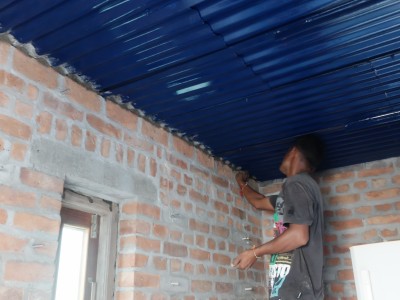 On 29th August I started a basic Hindi and literacy class based on playing with nimboos or lemons and card games for the 4-6 year olds. No one seems to be concerned that millions of children are not able to access online lessons and are receiving no formal education.
On 29th August I started a basic Hindi and literacy class based on playing with nimboos or lemons and card games for the 4-6 year olds. No one seems to be concerned that millions of children are not able to access online lessons and are receiving no formal education.
More lockdowns were introduced in August as "lockdown weekends" and then finally 28th August - 6th September was announced as a lockdown week over a crucial festival period of Ganesh Immersion Day (Anant Chaturthi) and Muharram which usually involve huge processions and crowds.
Farm life was largely unaffected as we contended with the usual problems of keeping rodents and snakes out. A false ceiling was put in the motorbike shed and every last tiny hole blocked. This is Ranjeet filling the holes with a cement-sand mixture, putting a stop to those pesky long tailed tree mice making the shed their home. The beam in his own living quarters had been eaten by rats, so a sturdy babool tree post with a fork at one end was put under it to support the beam and roof to last the monsoon till further repairs are possible. When his television stopped working he found a mouse inside it!

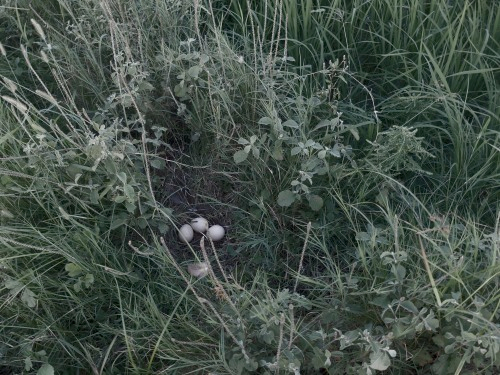 While out on a walk one evening we came across a peahen sitting on these three eggs. She was so well camouflaged and only took flight when I nearly stepped on her. A few days later (5th September) only one egg remained in the nest. You can see the nest is right up against a rice field. The darker green plants at the back are rice plants.
While out on a walk one evening we came across a peahen sitting on these three eggs. She was so well camouflaged and only took flight when I nearly stepped on her. A few days later (5th September) only one egg remained in the nest. You can see the nest is right up against a rice field. The darker green plants at the back are rice plants.
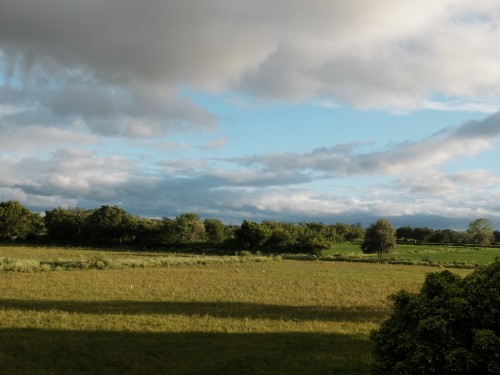 We look forward to our monsoon clouds. This was a beautiful sunny evening at the end of the month. All the fields are waterlogged, as we have heavy clay soil, but they are thick with grass which the cows appreciate. The fields to the right which are darker green are rice.
We look forward to our monsoon clouds. This was a beautiful sunny evening at the end of the month. All the fields are waterlogged, as we have heavy clay soil, but they are thick with grass which the cows appreciate. The fields to the right which are darker green are rice.

The international media is telling the world that corona virus is out of control without mentioning the 1200 people who die from TB every day. There have been 4 million recorded corona cases and 70,626 deaths which comes to 470 a day over the last five months, approximately 1.7%. The main reason for the low hospitalisation and death rate is that treatment with hydroxychloroquine, zinc, vitamins D and C, plus an antibiotic is recommended from day 1, but HCQ is still not WHO approved.
On the Farm - July ’20
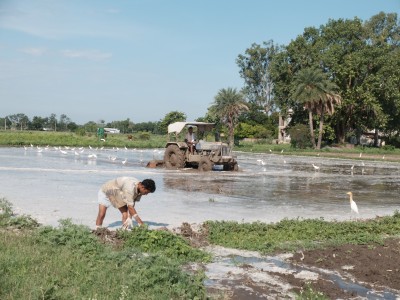
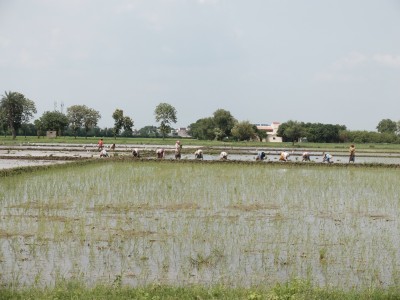
After reasonable rain in June we were looking forward to the arrival of the monsoon in July, but in fact we had less rain than June. June-15.3 cms. and July-11.5 cms., whereas last year we had 54.3 cms. in July. And so it was very hot all month, but we flooded the fields and planted the rice anyway.
Once the section of the a field has been flooded it is churned up by tractor which we call guddling (actually grading) and then the team of 11 women moved in to transplat rice seedlings. We started late this year to allow the weeds to germinate before being ploughed in and because of lack of rain; so the women started working on 17th and kept going until the end of July.
Our summer vegetables came to an end so the cows were let in to graze and then the vegetable garden was cleared, ploughed and planted with sweetcorn, okra and guar. This year we tried peanuts at Ranjeet’s insistence but the gilleries (squirrels) ate them all.

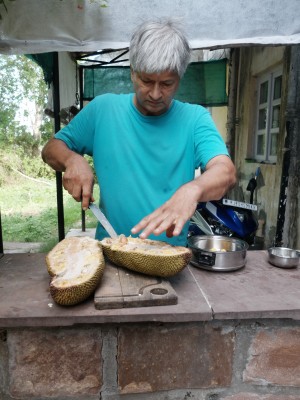 We did experiment with jackfruit (katail) and tried various recipes from YouTube. From ice-cream to curries. The hardest thing is to cut up the jackfruit as it exudes a very sticky white latex. You have to coat your hands and knife in oil. Once it is really ripe it can be eaten raw and is sweet but develops a strong smell. The seeds can be eaten in many ways e.g. boiled and dry roasted with salt.
We did experiment with jackfruit (katail) and tried various recipes from YouTube. From ice-cream to curries. The hardest thing is to cut up the jackfruit as it exudes a very sticky white latex. You have to coat your hands and knife in oil. Once it is really ripe it can be eaten raw and is sweet but develops a strong smell. The seeds can be eaten in many ways e.g. boiled and dry roasted with salt.

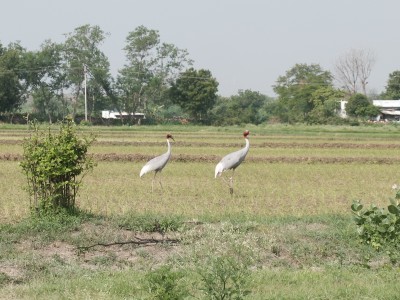 And here are a a pair of sarus cranes enjoying the freshly planted rice fields. They are rare but very welcome visitors these days.
And here are a a pair of sarus cranes enjoying the freshly planted rice fields. They are rare but very welcome visitors these days.
Our Gypsy 4WD was reconditioned and the body welded and resprayed. It is now 29 years old. We went for a trip out into the countryside and there life is back to normal with no covid-19, few masks and little attempt at social distancing. In town it was different and masks were obligatory and hand sanitiser and temperature guns ubiquitous.
The Rajasthan state borders were closed for some time although trains were running to Delhi and Mumbai. Very few buses running, so packed auto-rickshaws and an upsurge in motorbike purchase and use. No schools reopened at the beginning of the session in early July and no provision was made for children from homes with no internet for online classes. I bought books and slates and encouraged Asha, who is literate, to teach the children each morning.
On the Farm - June ’20
 The main focus in June was finishing the toilet block during a period of easing of lockdown. The men came to apply the terrazzo on the floor and walls on the 6th and it was dry and ready to be polished on the 11th. The power was off for hours at a time but they patiently sat it out. By the 15th the painter came and painted the inside of the toilet block. He also repainted the house roof with waterproof paint to keep the rain out.
The main focus in June was finishing the toilet block during a period of easing of lockdown. The men came to apply the terrazzo on the floor and walls on the 6th and it was dry and ready to be polished on the 11th. The power was off for hours at a time but they patiently sat it out. By the 15th the painter came and painted the inside of the toilet block. He also repainted the house roof with waterproof paint to keep the rain out.
We had our first ‘social’ event for months when Vijay’s aunt died on 4th June aged 97 and he attended her cremation. All the 20+ men present wore masks, and her mask wearing daughters and grand-daughter lit the pyre, which is still unusual.
On the 12th day there was the traditional ceremony to feed Brahmins, followed by a lunch for family members. The thirteen family members who gathered sat well spaced out and wore cloth masks except for when eating. There is near total compliance to the masks rule among most people, although bandanas are more prevalent in rural areas. It is seen more as a matter of courtesy than effectiveness.
Some of the workmen came with masks but we didn’t wear them on the farm. As soon as non-essential travel was allowed Vijay shot off to Jaipur and back in a day to collect a new motorcycle battery. Overnight guests were still not allowed in the apartment blocks in Jaipur.

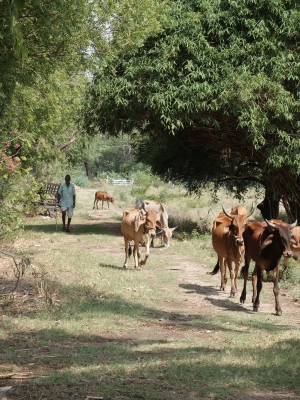
In June we usually have one or two pre-monsoon showers but this year we had rain on 15 different days totalling 15 cms (last year we had 3.5 cms on the last 3 days of June.)
The farm-hands repaired the roofs with new tiles as necessary and cut thorns along the rice field boundaries in preparation for bare footed women planting rice. Dhaincha was broadcast as green manure and ploughed over to cover the seeds. The farm began to flush green and this photograph, taken on 23rd June captures the beginning of monsoon.
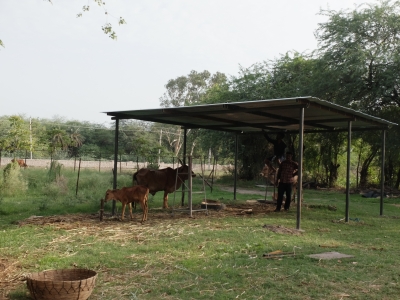
Lasho, our geriatric bull, has been living tied to a jamun tree so a tin shed was put up on 28th for him. It also doubles as a ‘milking parlour’ in the rain. He was moved just in time as a sizable branch of this jamun tree came down in strong winds.

Electric fittings were put in the toilet block and it was connected to the mains on 18th June. The joiner came on the 19th and fitted the windows he had made, and prepared doors from New Zealand plywood covered in formica. On the 22nd Amar Lal and family moved their possessions into the toilet block and slept outside while the floor of their living quarter was raised to help prevent flooding in the monsoon. Once Amar Lal had moved out, the finishing touches of plumbing, window frame oiling etc. were done in time for the official opening in the evening of 28th. The building had been 13 months in the making from one delay or the other, but particularly a very wet monsoon last year and covid-19 lockdowns this year.
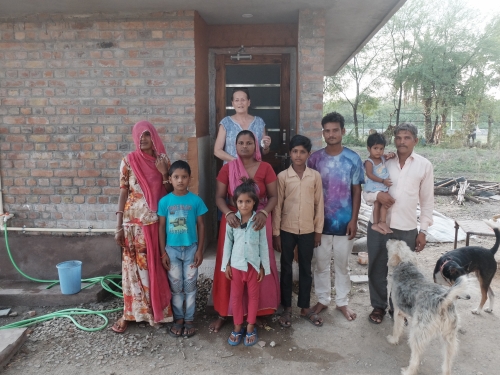
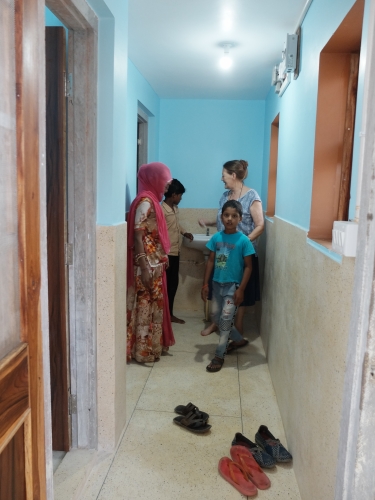

There had been no cases of corona virus associated with the farm or village and Kota deaths stood at approximately 20, but the number of cases in India’s metros had started to increase rapidly as lockdown eased. We escaped locust destruction this month (some did appear on the farm and quickly moved on) and hope they won't visit once the rice is planted. A very real danger.
On the Farm - May ’20
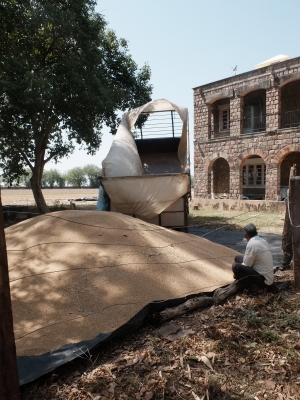 We started May looking forward to the end of lockdown-2 on the 3rd. A trolley load of wheat sold at the mandi for Rs. 1800 per quintal on the 1st. The Government support price was Rs. 1925 but they were buying very little and very slowly.
We started May looking forward to the end of lockdown-2 on the 3rd. A trolley load of wheat sold at the mandi for Rs. 1800 per quintal on the 1st. The Government support price was Rs. 1925 but they were buying very little and very slowly.
With some easing of restrictions certain rural industries were allowed to start and we could smell the brick works.
On the 4th the male labourers at the mandi went on strike as they wanted women labourers to come and sweep up for them, but the ususal women were in a containment zone nearby. As soon as a compromise was reached the artiyas went on strike over the sudden imposition of a 3.6% increase in the tax that they had to pay - applicable only in Rajasthan.
We took the unusual decision to empty a ready filled wheat trolley as the trolley was needed for moving wheat bhousa from the fields. We weighed the trolley at a weighbridge before emptying it.
Despite a night curfew from 7:00 pm to 7:00 am agricultural work went on at night as the daytime temperature was in the mid-40oC. A team of unemployed construction workers came at night to manually load wheat chaff from the piles in the fields and deposit it in the bhousa ghar, after removing some tiles from the roof to make a hole, and also in piles outside in three places. Job creation for desperate people, but important for our cattle. These young men were from farming families and were known personally to us. They came to ask for the bhousa contract. Rs. 500 per trolley load shared between eight of them, and the same sum for emptying a trolley load in the bhousa ghar. They filled and emptied 17 trollies over 2 nights.
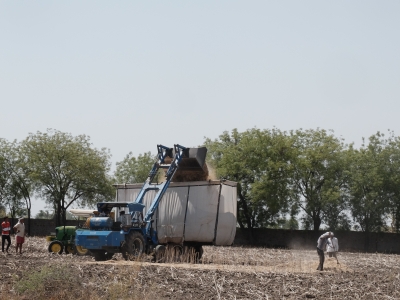 But on the other side of town the labourers have left and the man who bought the mustard bhousa from us couldn’t get workers and came with a tractor mounted shovel to load his tractor trailer. This is the first time we have seen this on our farm.
But on the other side of town the labourers have left and the man who bought the mustard bhousa from us couldn’t get workers and came with a tractor mounted shovel to load his tractor trailer. This is the first time we have seen this on our farm.
During the lockdown we could hear people cutting wood in the municipality owned land across the road with no one checking on them. (Similarly, some poaching was reported of deer, and some tigers in Sariska and Ranthambore santuraries have not been seen recently.) The politicians were delivering dry ration kits to some, but many people were living on credit from their local shop and eating very little.
One of our hallis, Dinesh, moved to another local farm and a former halli, Ranjeet, asked to come back. Ranjeet had worked for us in 2010 when aged 20 and newly married. His first son, Ashish, was 20 months old when his father left to earn more doing reinfored cement concrete (RCC) work. He now has three sons and had outstanding rent and food bills with no income in sight because of the corona virus lockdown. One son was living with one set of grandparents, and a another had gone to the other set in early March and they hadn’t been able to see him since - he is aged 4 years. We paid off his debts and he moved back to the farm on the 24th. He weighed 53 kgs. and his wife, Asha, 38.5 kgs. This is one family known to us that we have been able to help. What about millions of others trying to reach their home villages in desperation? (Incidentally, Dinesh’s new employer paid off his debts to us.)
From 13th May our men could go shopping in Kaithoon 5 kms. away on bicycles as long as no vehicles were used. No buses or public transport were running. There has never been one positive corona virus case around here to date. They had all been in the densely packed areas in town.
On 15th May, a local man employed as a chowkidar by a relation of ours was found murdered. He had been slashed in the face with an axe according to reports. He had recently been here with his metal bars to ‘cure’ a calf with a dislocated shoulder. He heated them in a cow dung fire and singed muscle with the rods so the joint slips back in place. Each village used to have someone who knew this technique of daah, as it is called in Hadoti. Our local knowledge has now gone. The identity of the murderer and motive is still unknown.
17th May was the official end of lockdown-3 and we’re into lockdown-4. The mandi opened again post-strike, the trolley was again filled with wheat, the last bags piled on top and off it went to be sold. Only Rs. 1755 per quintal against the Government price of Rs. 1925. We’d tried to sell it direct to the mills as is now allowed under a change of law, but they weren’t offering the minimum support price or close to it - dropped that idea.
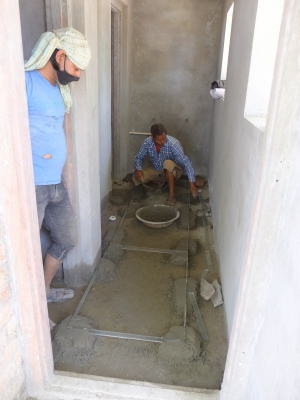
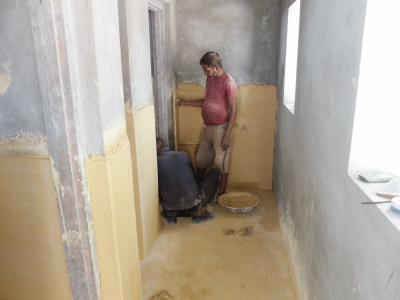
On 20th May the toilet block work re-started as construction work was allowed again. The septic tank was concreted over, the sewage pipes also enclosed in concrete, and the inspection chambers finished. Inside the toilets, the floor was prepared for thin terrazzo with glass strips. White cement was mixed with a golden yellow colour and a terrazzo mixture made with white and black marble chips in a 1:7 proportion. The prepared mixture was applied. After drying it will be polished by machine.
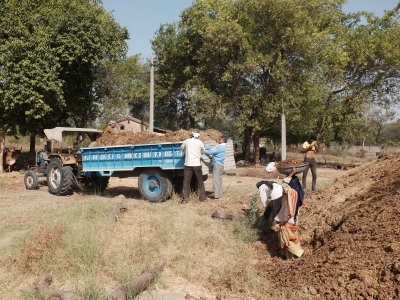
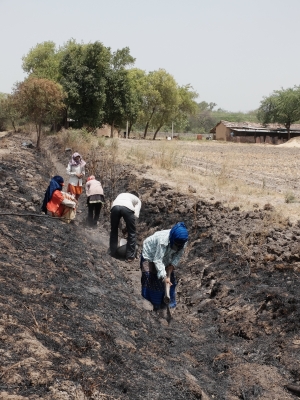
During the hottest week of the year - up to 47oC - we employed a family of two men and four women to spread gobar manure in one of our fields. We then tasked them to clear a drainage channel as more job creation and the four women came but only one man. It is said that 300 local labourers have been taken on at the sewage treatment plant construction site across the road in an effort to give employment to as many people as possible. With all hotels, restaurants, schools, colleges, shopping malls and religious places still closed, employement chances are slim for now.
On the Farm - April ’20
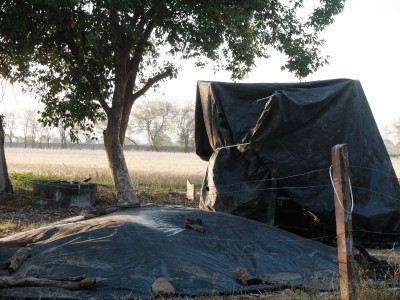 We entered April naively thinking that the lockdown would end on 14th April but by the end of the month we were two-thirds through lockdown phase 2. Here the March mustard crop sits ready but locked down. The wheat has ripened in the field behind it.
We entered April naively thinking that the lockdown would end on 14th April but by the end of the month we were two-thirds through lockdown phase 2. Here the March mustard crop sits ready but locked down. The wheat has ripened in the field behind it.
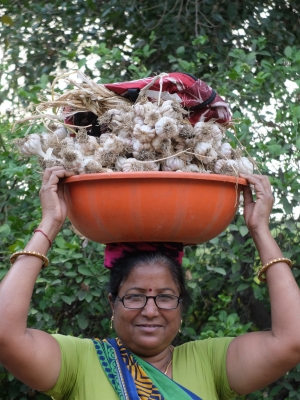 Luckily agriculture and the wheat harvest were to go on although the markets were closed. We harvested our garlic from the vegetable garden, plaited it and shared it out amongst five employees. Here is Sugna taking her share home. She managed to walk here every day apart from the curfew day on 4th April, when teams of medical personnel went from house to house looking for possible corona virus cases, and contact tracing. Even the dudh wallah was not allowed to leave his house to sell his milk that day. Police chased the children back into their homes with lathis.
Luckily agriculture and the wheat harvest were to go on although the markets were closed. We harvested our garlic from the vegetable garden, plaited it and shared it out amongst five employees. Here is Sugna taking her share home. She managed to walk here every day apart from the curfew day on 4th April, when teams of medical personnel went from house to house looking for possible corona virus cases, and contact tracing. Even the dudh wallah was not allowed to leave his house to sell his milk that day. Police chased the children back into their homes with lathis.
Movement on the main roads was tightly controlled and I had difficulty persuading the police to let me through the barricade for a weekly fruit and vegetable shop. Masks had to be worn. It is difficult to imagine how hard it was for people with no income for six weeks. The poorest received free wheat from the ration shops (5 kgs. per adult per month) and dry rations from the local MLA funded by private donations. Small amounts i.e. Rs. 500 were paid into the bank accounts of the poorest women each month, but the rest?
On 7th April six women came to cut the wheat. They were paid in kind (wheat) and we held to last year’s rate of 90 kg. per bigha as the government support price for wheat had gone up to Rs. 1925. No combine harvester was used this year and some fields were given to two other groups of harvesters to speed up the work and share the benefits in the absence of other work. This year the unemployed sons of the women were free to help and would come to stack the wheat into gallas and to do the threshing.
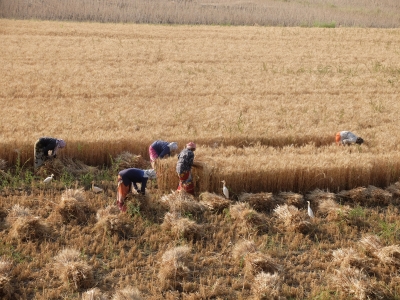
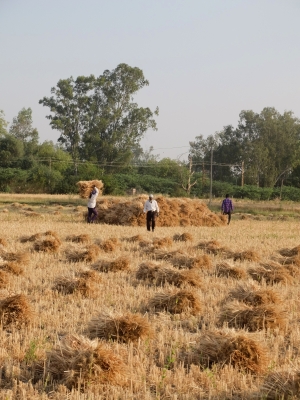
The green fodder or bersin for the cows had finished so we broadcast some sood/jo/bajra which will be ready in a few weeks. In the meantime, as we were low on other fodder, we threshed some wheat as quickly as possible so the cows could eat the bhousa or chaff.
By 20th April mining and some rural factories were allowed to restart and the agricultural market opened but just for wheat using a token system to prevent the usual crowds.
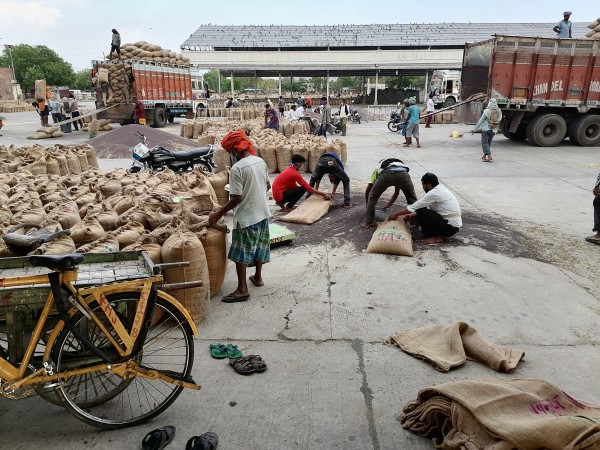
On 28th we heard that the mandi was going to accept mustard and chana for sale for two days so we loaded the trolley and sent it on the 29th. It got the best price of the day at Rs. 39.48 per kg. which made it worth the wait. Very few people grow mustard nowadays if they have water for wheat and rice. In this photograph, our mustard is being weighed and bagged in the foreground by masked labourers. In the background 50 kg. sacks of mustard are being loaded manually into a truck. The scene is quiet and orderly with social distancing being followed in name.
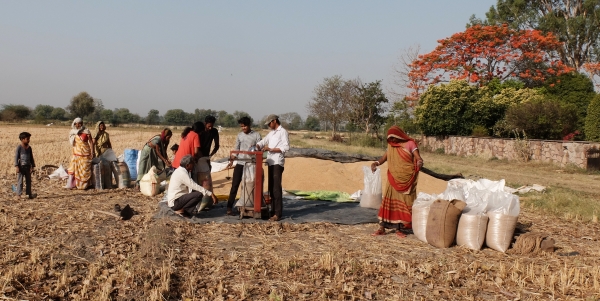
On the final day of April the women cutters and their out-of-work sons and husbands came to bag their earned wheat and carry it home on their motorcycles or the tractor-trolley provided by our only share cropper. Not a mask in sight. In the background you can see a gul mohar tree in full flower. The air is clear and we enjoyed unpolluted air for the whole month with little traffic noise and more assertive wildlife.
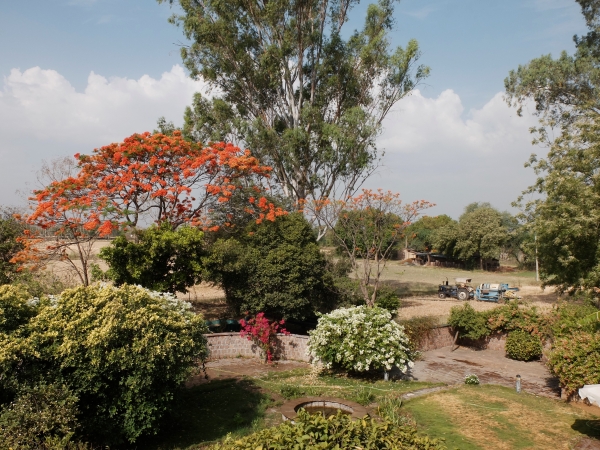
Let us see what May brings.
On the Farm - March ’20
Little did we imagine at the start of the month that by the end India and its 1.3 billion people would be under curfew and that a large percentage of them would have lost their source of income in four hours flat. The lockdown was announced at 8pm on 24th March to come into effect at midnight. We had been in a state of semi-lockdown since the mandatory "People's Curfew" for 24 hrs. on Sunday, 22nd March which we had been told then would last until the 31st. Suddenly total lockdown hit. In the whole of March not one positive case of corona virus was found in Kota.
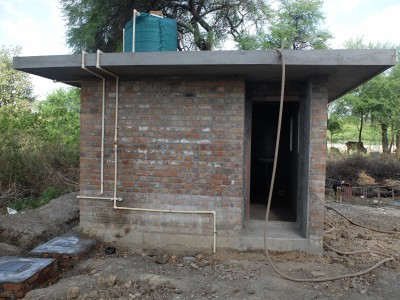 The toilet block progressed at first and the plumber came and installed two white tanks on the roof which we covered with green netting to make them less visibile and aesthetically acceptable. All toilet pans, basins and piping were installed by 8th March in time for the Holi festival.
The toilet block progressed at first and the plumber came and installed two white tanks on the roof which we covered with green netting to make them less visibile and aesthetically acceptable. All toilet pans, basins and piping were installed by 8th March in time for the Holi festival.
Holi was on the 10th but very few people came to visit us. There was a feeling that mixing with people was not a good idea but social distancing as a concept had not been enforced in India, just hand washing.
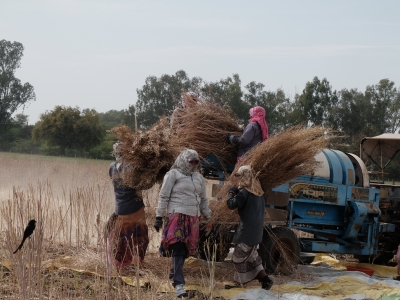
Eight women started cutting mustard on 3rd March and threshing took 2.5 days from 16th March. They had to cut the mustard, leave it to dry and later pile it up into gallas and finally feed the thresher. That was over by the 18th and since then women have barely been out of their houses. They are keen to hand cut our wheat but want an increase in the amount of wheat in kind they will be paid per bigha.
The mustard seed is piled in a heap near the house and also stored in a trolley wrapped in black plastic. At first the mustard price was very depressed and then the mandi closed entirely. Who knows what price farmers will get once the agricultural world limps back to normal.
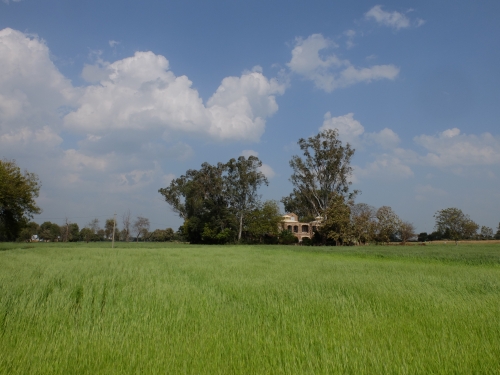
The wheat had to be watered this month and we had some very blustery windy weather around 6th March with beautiful clouds and colouring as the wheat was blown in the wind and swayed rhythmically - reminded me of the colours in Britain. By the end of the month the green had ripened to golden and the weeds had grown taller than the crop and become very visible. We don’t spray weedicide. Luckily it was still green enough to be undamaged by the band of rain and thunder that swept across the country on 27th March, but many farmers had damage from hailstones.
The weather was very pleasant all month with snow on the Himalayas later than usual and by the end of March India had its cleanest air quality for decades with the closing of most industry and the total ban on transport.
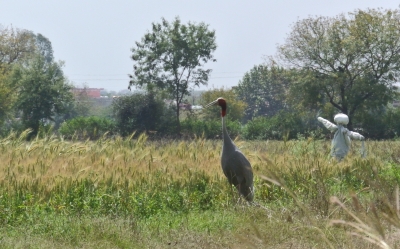
As humans have retreated nature has begun to take back space and nilgai have been spotted sauntering through shopping areas of Delhi. We had a visit from India’s largest bird, a sarus crane. They used to visit regularly but are now seldom seen on the farm.
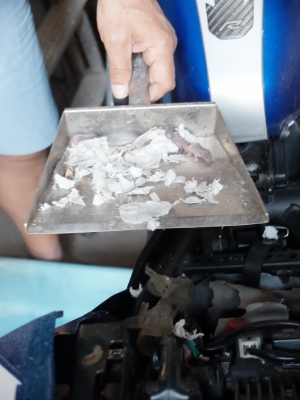
One little rodent that seems to be doing well is the longtailed tree mouse. When Vijay’s motorcycle wouldn’t restart at a petrol station on 4th March one jumped out when he removed the seat to inspect the battery. The battery had died and a suitable replacement was ordered. It reached Jaipur but became "locked down." Since the bike was not being used it was stored inside the "mouse proof" shed, but another longtailed tree mouse chose the cavities of the bike to build her nest. Rags bunged in to cover the removed seat and battery were welcomed and shredded for its litter.
By 31st March we were one week into total lockdown with another two weeks to go. Luckily two farm workers live on the farm and the other two were able to walk here to look after the cows - and us!
On the Farm - February ’20
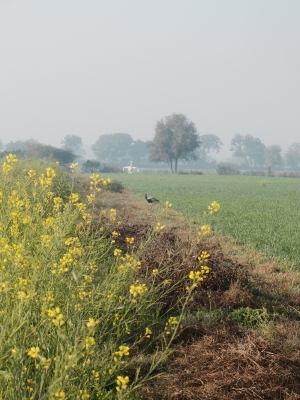 At the beginning of February the mustard was still flowering, but by the end the seeds were swelling and ripening.
At the beginning of February the mustard was still flowering, but by the end the seeds were swelling and ripening.
The main farming work was watering the wheat and guarding it against nightly invasions of nilgai. A group of young ones chaperoned by one or two wise elders, nine in all, used to appear in the wee small hours when they expected it to be safe for the nursery group. But Vijay was out there flashing a powerful torch forcing them to move on.
Doosra, our outdoors dog, mostly alerted us to the arrival of the nilgai but on the 11th he chased a nilgai onto the next farm at 0900 hrs. and got into a fight with their dogs. He was badly mauled and howled in pain each time he got up or sat down. Since he is not used to being handled we gave liquid pain killer twice a day in his milk to help nature’s healing. He licked his wounds to heal gradually.
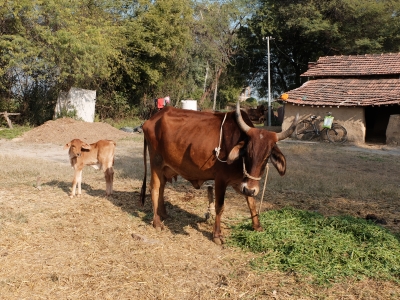 One more calf was born, a third male on the trot, on 8th February and we named him Moti which means pearl. The three recently born calves - Abhinandan, Bojo and Moti - love chasing each other. We can reveal the solution to the problem outlined last month of Poonam turning around and drinking her own milk. She now wears a cotton rope harness to prevent her doing that.
One more calf was born, a third male on the trot, on 8th February and we named him Moti which means pearl. The three recently born calves - Abhinandan, Bojo and Moti - love chasing each other. We can reveal the solution to the problem outlined last month of Poonam turning around and drinking her own milk. She now wears a cotton rope harness to prevent her doing that.
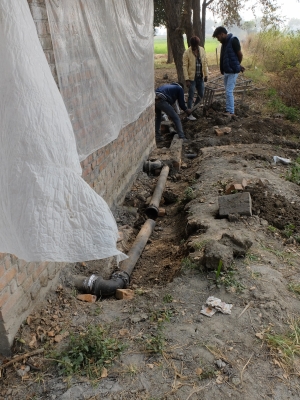 Work continued slowly in the toilet block with a young couple finishing the internal plastering work. Other young people moved the soil heaps tagari by tagari (headloads in metal bowls) to landscape around the block. A trench was dug for the external pipes and by the end of February the pipes were laid and we were waiting for the plumber.
Work continued slowly in the toilet block with a young couple finishing the internal plastering work. Other young people moved the soil heaps tagari by tagari (headloads in metal bowls) to landscape around the block. A trench was dug for the external pipes and by the end of February the pipes were laid and we were waiting for the plumber.
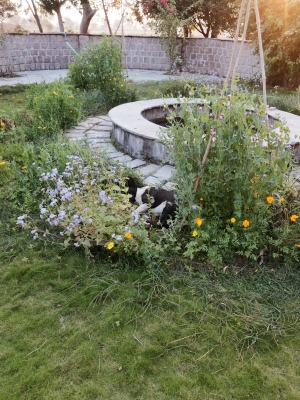
And here is Doosra recuperating in his favourite place, my wild flower bed. I collected the seeds from cultivated sweet peas last year and planted them but they all returned to type and have produced clumps of tiny pale mauve sweet peas which sadly have no fragrance that we can detect but maybe Doosra was benefitting from aromatherapy.
On the Farm - January ’20
We could wait no longer for the price to go up and on 1st January the first trolley of rice left for the mandi. We sold 5 trolley loads over the next few days and Rs. 20.75 per kg. was the highest we received. Last year we got Rs. 28.51 so a huge drop in yield, price and income.
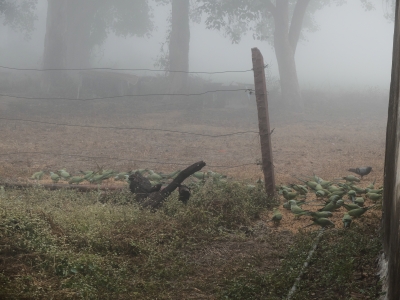 There were several very misty days in January and the sun usually came through after 11:00am. Here the parakeets are enjoying scattered rice grains. Wild boar, nilgai and monkeys also enjoyed gorging on our crops. And let’s not forget the long-tailed tree mouse found to be living inside the diamond frame tubes of the Yamaha R3 motorcycle and which had to be partly dismantled to evict the mouse and tape the wires it had gnawed into.
There were several very misty days in January and the sun usually came through after 11:00am. Here the parakeets are enjoying scattered rice grains. Wild boar, nilgai and monkeys also enjoyed gorging on our crops. And let’s not forget the long-tailed tree mouse found to be living inside the diamond frame tubes of the Yamaha R3 motorcycle and which had to be partly dismantled to evict the mouse and tape the wires it had gnawed into.
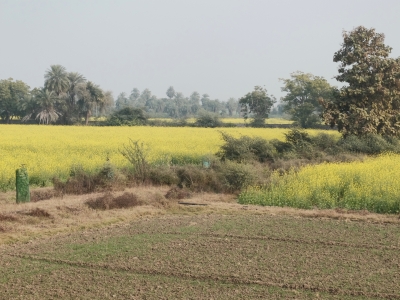 Within a few days of sowing, the wheat germinated and towards the end of January was having its first watering of three. There was a very short shower but no significant winter rains this year. The mustard was flowering at the beginning of the month and was finishing by the end.
Within a few days of sowing, the wheat germinated and towards the end of January was having its first watering of three. There was a very short shower but no significant winter rains this year. The mustard was flowering at the beginning of the month and was finishing by the end.
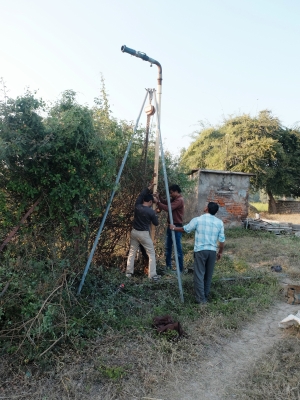 Continual watering from the borewell may have caused the motor to burn out. We have an efficient repairer in the village and using a tripod the submersible pump and motor were hauled out, the motor was removed, rewound and re-installed the following day.
Continual watering from the borewell may have caused the motor to burn out. We have an efficient repairer in the village and using a tripod the submersible pump and motor were hauled out, the motor was removed, rewound and re-installed the following day.
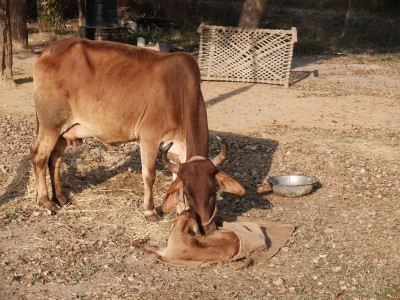 After a long period of over four months with no milk from our cows, we had two calves born this month. The first on 8th January and the second on 30th being just one day before Brexit and so he was named BoJo (Boris Johnson). Usually we start taking milk from each cow after five days when it stops curdling when boiled. The new mother is given a fortifying mixture of melted gur or brown sugar with aj-wa-in (carom seeds rich in calcium and iron), and broken wheat morning and evening for a week. Since the nights were cold, down to 6oC on some nights, we left the milk for the calf for two weeks before taking 1 litre each day just in the evening. We then discovered that Poonam, the cow, had been drinking her own milk and this problem just has to be solved....
After a long period of over four months with no milk from our cows, we had two calves born this month. The first on 8th January and the second on 30th being just one day before Brexit and so he was named BoJo (Boris Johnson). Usually we start taking milk from each cow after five days when it stops curdling when boiled. The new mother is given a fortifying mixture of melted gur or brown sugar with aj-wa-in (carom seeds rich in calcium and iron), and broken wheat morning and evening for a week. Since the nights were cold, down to 6oC on some nights, we left the milk for the calf for two weeks before taking 1 litre each day just in the evening. We then discovered that Poonam, the cow, had been drinking her own milk and this problem just has to be solved....
And after almost two cold months the plastering has started in the toilet block. The delays have been due to the contractor’s wife being in and out of hospital several times for a routine gall stone removal and he has also been ill. Hopefully, we can now get on and get the project finished. On 31st January a young husband and wife team came and started plastering the inside of the block.

